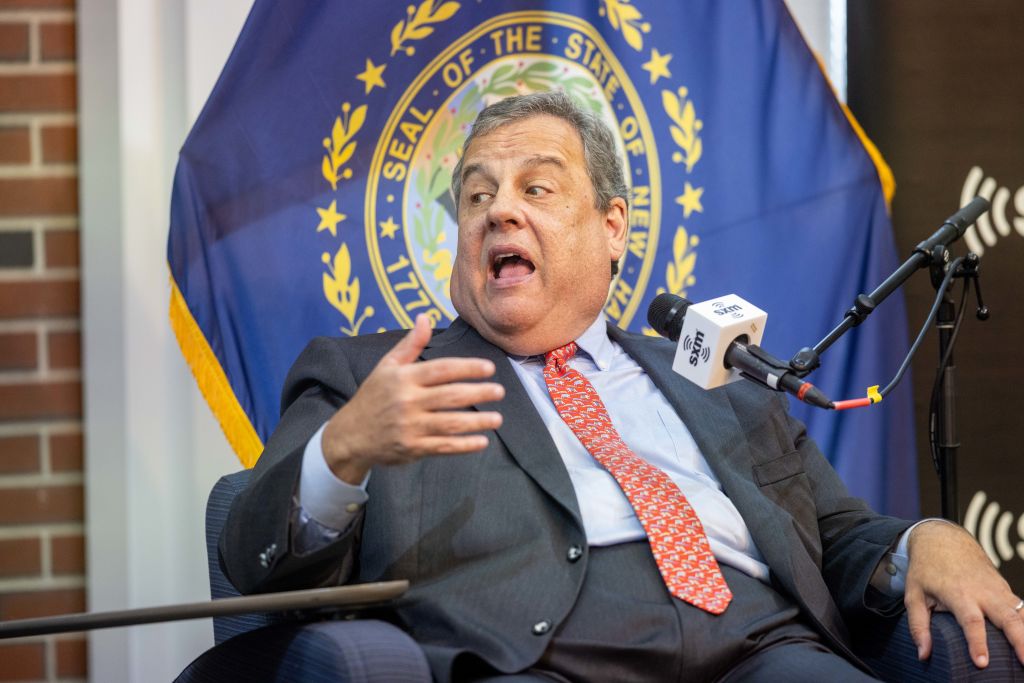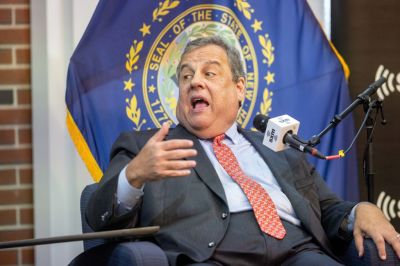LACONIA, New Hampshire—Chris Christie is as stubborn as he is combative.
For eight years, the Republican Party has been dominated by Donald Trump, a conservative populist with questionable morals. The former president packs arenas by the thousands and is the overwhelming frontrunner for the GOP nomination. But Christie insists on running a traditional campaign, as a traditional conservative. The former New Jersey governor is appearing at Rotary Club luncheons and hosting intimate town hall meetings, aiming to pull off an improbable upset in the Republican primary by making an issue of Trump’s character.
“The biggest issue in this race, before we get to any specifics, is character; is character,” Christie tells a town hall gathering of just under 50 people in early October. This isn’t a concert-like Trump rally (or even a more modest Nikki Haley rally). No music is blaring at the Elks Lodge in Laconia, a rural community of roughly 17,000 along Lake Winnipesaukee in central New Hampshire. No Christie signage decorates the background—just two large American flags, which flank either corner of the room.
Christie, 61, speaks without a microphone for more than two hours, pacing back and forth and mostly ignoring the stool placed for him in the middle of an audience arranged in a round. Periodically, he stops to make eye contact as likely GOP primary voters pepper him with questions. Toward the conclusion of the event, after a campaign aide tells Christie it’s long past time to wrap things up, he raises the issue of character, again—the perfect campaign pitch for a Republican presidential candidate running in any contest prior to 2016.
“The president is such a unique job in the world. You set the example for everything you do. One of my biggest problems with Donald Trump is, he doesn’t care. He doesn’t care that he’s setting an awful example for our children and our grandchildren,” Christie says. “He doesn’t care—he only cares about the person he sees in the mirror. And if that’s the kind of president we have, then this is the kind of country we’re going to have: divided, angry, ugly, self-consuming.”
Christie’s blunt style still plays well with many Republican voters, as it has since he first made a splash by winning the governor’s mansion in deep blue New Jersey nearly 14 years ago.
Even Republican voters who are fond of Trump’s presidency and would likely support the former president if he wins the 2024 nomination are glad Christie’s in the race. Ned Lizotte, 63, an undecided voter and registered independent who regularly participates in Republican primaries, compared the former governor—favorably—to Jed Bartlet, the fictional president (and former New Hampshire governor) in The West Wing, the hit NBC drama that aired from 1999 to 2006.
“You want a Martin Sheen who’s kind of like a real guy—man or woman, just a real person showing their integrity and being able to implement that,” Lizotte, a graphic designer who drove 40 miles roundtrip from Loudon, just northeast of Concord, to see Christie. “You want to have somebody who you can pray for.”
Christie didn’t necessarily intend to be Trump’s ardent nemesis.
Christie exited the Republican primary in 2016 after a disappointing finish in New Hampshire, then quickly provided Trump with a crucial endorsement at a critical moment in that campaign—with Super Tuesday approaching and with the nomination still in doubt. Christie then proceeded to become an informal adviser to Trump, his longtime acquaintance, throughout the 45th president’s term in the White House. Among Christie’s chief roles: assisting his former rival with debate prep. The former federal prosecutor played the role of Joe Biden in practice sessions with Trump in the late summer and fall of 2020.
But after Trump refused to concede his loss to Biden, Christie disavowed him; in early June of this year he launched a longshot bid for the Republican nomination. Christie has managed to climb into fourth place here in New Hampshire, where he has campaigned almost exclusively. But it’s a distant fourth. Trump leads in the Granite State with 45 percent; Christie garners just 9 percent. Nationally, the former governor is even further behind.
Voters who plan to participate in the New Hampshire GOP primary (independents are eligible) and hope to nominate any Republican other than Trump are watching Nikki Haley climb in the polls and wondering whether pulling the lever for Christie is counterproductive. During a Rotary Club luncheon seaside in Portsmouth, a few hours before the town hall meeting in Laconia, Larry Gray, 70, tells Christie he is exactly the sort of Republican he plans to support in the primary.
But: “Tell me why I should vote for you and not Nikki Haley,” Gray, a registered independent, says.
Haley, the former South Carolina governor and former U.S. ambassador to the United Nations, has been on the rise since the first Republican presidential debate in Milwaukee in late August. She is now running second in New Hampshire, though with 14.2 percent support, still well behind Trump. Christie isn’t overly concerned—at least that was the company line during a wide ranging interview with The Dispatch between campaign appearances in New Hampshire.
“The overwhelming majority of people are going to come to the conclusion—in this state, that [Trump] shouldn’t be president again, and that he can’t beat Joe Biden, and I think they’re going to want the person who’s been the most clear about that and the most direct about it,” Christie says. Haley, Christie says, has not. The former governor’s confidence is based partly on his assessment of the New Hampshire electorate, which he believes is filled with silent anti-Trump voters.
“The very same dynamic that happened in 2016 is happening in the reverse. In 2016, it was politically incorrect to say you were for Donald Trump,” Christie says. “The exact opposite is happening in 2023. It’s not politically correct as a Republican to say you’re against Trump. Because Republicans say: ‘Oh, if you’re against Trump you’re for Biden. That’s not the case. But people think that, fear it, and so they just say they’re for Trump.”
More so than his Republican competitors, Christie seems preoccupied not just with finding a way to win the GOP nomination, but how to make sure Trump—somehow—does not. How preoccupied? Christie, acknowledging the obvious, says the field of candidates must shrink if any Republican is going to have a chance to coalesce enough support to defeat Trump—and he is willing to exit the primary if it becomes clear one of his competitors is on the cusp of doing so.
“If somebody were to beat Trump in either Iowa or New Hampshire, I think it’s going to be very hard to stop the momentum of that person going forward and I think it’s going to be very hard for the other candidates in the race to make an argument against them,” Christie says.
But even in New Hampshire, where support for Trump is below 50 percent, Republican insiders are growing doubtful that the former president will be defeated. The crowded GOP field, with more than seven candidates, is a major contributing factor to Trump’s strength—as if he needed additional help.
But voters here who hope public opinion polls are not prologue are with Christie, in so much as they argue it’s far too early to declare the Republican primary in New Hampshire a foregone conclusion. Priscilla Moore, a middle-aged registered Republican vehemently opposed to Trump, is hopeful enough that she made a two-hour roundtrip drive from the edge of New Hampshire’s North Country to hear Christie out.
“America is in a precarious position,” she said. “We need to come forward, find out what we can find out and try to figure out: Where do we go from here? And who can we find who has integrity and is responsible—and as like [Christie] says, has character?”







Please note that we at The Dispatch hold ourselves, our work, and our commenters to a higher standard than other places on the internet. We welcome comments that foster genuine debate or discussion—including comments critical of us or our work—but responses that include ad hominem attacks on fellow Dispatch members or are intended to stoke fear and anger may be moderated.
With your membership, you only have the ability to comment on The Morning Dispatch articles. Consider upgrading to join the conversation everywhere.